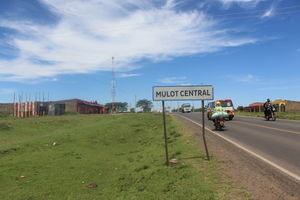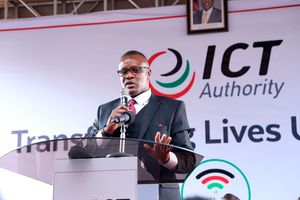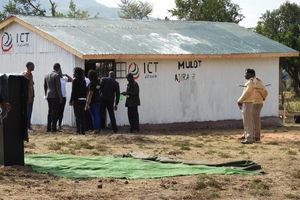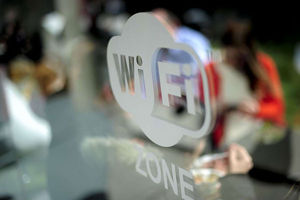
President William Ruto during the official opening of Connected African Summit, 2024 at the Uhuru Gardens, Nairobi.
President William Ruto’s pet projects to connect thousands of youth to digital jobs have suffered budget cuts in the financial year starting July 1, 2025.
The State Department for ICT and Digital Economy told lawmakers that over 10,000 youth will not be trained and linked to online jobs in the 2025/26 financial year after the Treasury slashed its budget for Ajira Digital Training Programme and the Jitume Digital Hubs.
Budget documents tabled before the National Assembly’s Departmental Committee on Communication, Information and Innovation show that the State Department for ICT and Digital Economy has a financing gap of Sh34.24 billion out of which Sh2.34 billion is for recurrent expenditure and Sh31.898 is required for development spending.
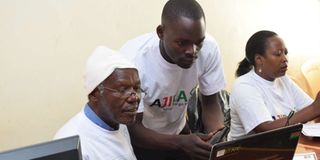
Mr Joseph Karanja, 78, (left) consults with a colleague during the graduation of 200 students under the Ajira Digital Programme at Mukurwe-ini Technical Training Institute in Nyeri County on March 13, 2019.
ICT and Digital Economy Principal Secretary John Tanui told lawmakers that Sh160 million is required to train and link 10,000 youth to online jobs in the next financial year.
He said the youth were to be trained under the Ajira Digital Training Programme and linked to online jobs, but the Treasury has not provided a budget line for the programme.
The Ajira Digital trains young people in digital skills and financial literacy to increase employment and entrepreneurship.
Mobile phones
The applicants are taken through a certification programme with different modules using computers, mobile phones or laptops and then issued certificates on completion.
At least one million youth enter the job market from universities, colleges and technical institutes every year.
Mr Tanui told the committee chaired by Dagoreti South MP John Kiarie that the Treasury has also not provided Sh737 million that is required to enhance activities for Jitume Digital Hubs, Wi-Fi hotspots, project supervision, site inspection and monitoring and evaluation.
The Jitume Digital Hubs is an Initiative aimed at providing the youth with access to Digital Services, Digital Skills, and Opportunities to enable them to take advantage of technology for job creation.
The State-backed programme is designed to equip vocational learners with market-ready technology-related courses for free.
Launched in December 2022 by President Ruto, the programme targets technical and vocational education and training institutions (TVETs) countrywide, with 23,000 virtual desktops and over a million learners.

Cabinet Secretary of the Ministry of Information, Communications & The Digital Economy William Kabogo (right) and State Department for ICT and the Digital Economy PS John Tanui after appearing before the National Assembly Departmental Committee on Communication, Information and Innovation at the Bunge Tower Nairobi on February 24, 2025.
“To fast-track implementation of key programs and projects, adequate financing is key for completion of ongoing initiatives, payment of pending bills and avoidance of potential legal litigations arising from unmet contractual obligations,” Eng. Tanui said.
“We recommend that the budget allocated to the State Department be ringfenced. This will enable timely implementation of government priority programmes and projects.”
Engineer Tanui said that under the 2025 BPS, the State Department for ICT and Digital Economy priorities aim at rolling out 25,000 government public Wi-Fi hotspots across the country to enable free internet access to the citizens.
The Ministry also plans to maintain and support the National Optic Fibre Backbone Infrastructure (NOFBI).
Innovation hubs
It also seeks to provide broadband connectivity equip 1,450 Constituency Innovation Hubs (CIHs), and facilitate training and mentoring youth to access online jobs.
The Ministry said it also plans to undertake cybersecurity management, digitisation of all government services and deployment of 100,000 kilometres of the digital superhighway.
But appearing before the committee to defend the Ministry’s budget as outlined in the 2025 Budget Policy Statement, engineer Tanui revealed that Sh100 million has not been provided for systems audit in 40 Ministries, Departments or Agencies (MDAs) to assess compliance with ICT standards, digitisation, data backups, and business continuity plans.
He said the Ministry lacks Sh1.34 billion for operations and maintenance in the semi-autonomous government agencies (SAGAs).
The PS said other development areas not funded include Sh100 million for Last Mile County Connectivity Network Phase IV and V, NOFBI Phase II Cable (Sh707 million), NOFBI Phase II Extension Cable (SH293 million), E-Government Support and Maintenance (Sh2.5 billion), Konza Complex (Sh516 million), and Digital Hubs (Sh94 million).
Also not funded are Konza Data Centre and Smart City Facilities (Sh150 million), Horn of Africa Gateway Development Project (Sh1.05 billion), Construction of Kenya Advanced Institute of Science and Technology (KAIST) at Konza Technopolis (Sh3 billion), Kenya Digital Economy Acceleration Programme (Sh18 billion), and Cyber Security Management (Sh2.8 billion).

